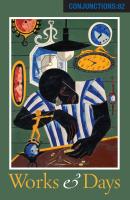![[A Reading by Richard Powers]](http://www.conjunctions.com/images/event_image.php?id=133678)
On Monday, April 16, at 2:30 p.m. in Weis Cinema, Bertelsmann Campus Center, novelist Richard Powers reads from his latest book, The Overstory. Presented by the Innovative Contemporary Fiction Reading Series, introduced by novelist and Bard literature professor Bradford Morrow, and followed by a Q&A, the reading is free and open to the public; no tickets or reservations are required. Bard’s literary journal, Conjunctions, will be giving away a limited number of copies of its Twentieth Anniversary Issue, which features an excerpt from Powers’s novel The Time of Our Singing.
After viewing August Sander’s photograph Young Farmers, Richard Powers was inspired to quit his job as a computer programmer and write his first novel. Powers spent the next two years penning Three Farmers on Their Way to a Dance, then moved to the Netherlands, where he wrote Prisoner’s Dilemma, a work that juxtaposes Disney and nuclear warfare. His other novels include The Echo Maker (2006), which won the National Book Award for Fiction and was a finalist for the Pulitzer Prize, and Gain (1998), which won the James Fenimore Cooper Prize for Best Historical Fiction. Powers’s works explore music, genetics, neuroscience, artificial intelligence, and virtual reality. His novels have been named Best Books of the Year by the Chicago Tribune, Newsday, Christian Science Monitor, London Evening Standard, and others.
Powers was named a MacArthur Fellow in 1989 and received a Lannan Literary Award in 1999. In 2010 and 2013, Powers was a Stein Visiting Writer at Stanford University, during which time he partly assisted in the lab of biochemist Aaron Straight. He currently lives in the foothills of the Great Smoky Mountains.
After viewing August Sander’s photograph Young Farmers, Richard Powers was inspired to quit his job as a computer programmer and write his first novel. Powers spent the next two years penning Three Farmers on Their Way to a Dance, then moved to the Netherlands, where he wrote Prisoner’s Dilemma, a work that juxtaposes Disney and nuclear warfare. His other novels include The Echo Maker (2006), which won the National Book Award for Fiction and was a finalist for the Pulitzer Prize, and Gain (1998), which won the James Fenimore Cooper Prize for Best Historical Fiction. Powers’s works explore music, genetics, neuroscience, artificial intelligence, and virtual reality. His novels have been named Best Books of the Year by the Chicago Tribune, Newsday, Christian Science Monitor, London Evening Standard, and others.
Powers was named a MacArthur Fellow in 1989 and received a Lannan Literary Award in 1999. In 2010 and 2013, Powers was a Stein Visiting Writer at Stanford University, during which time he partly assisted in the lab of biochemist Aaron Straight. He currently lives in the foothills of the Great Smoky Mountains.
PRAISE FOR RICHARD POWERS
“If Powers were an American writer of the nineteenth century … he’d probably be the Herman Melville of Moby-Dick. His picture is that big.” —Margaret Atwood, New York Review of Books
“Powers is prodigiously talented. Besides being fearfully erudite, he writes lyrical prose, has a seductive sense of wonder and is an acute observer of social life.” —New York Times Book Review
“Richard Powers, whose novels combine the wonders of science with the marvels of art, astonishes us in different ways with each new book.” —NPR Books
“Of novelists in Powers’s generation with whom he is often compared—Franzen, Vollmann, Wallace—none equals Powers’s combination of consistent production, intellectual range, formal ingenuity, and emotional effect.” —Christian Science Monitor
“Powers may well be one of the smartest novelists now writing.” ―Los Angeles Times Book Review
“Powers’s writing is complex and heady without being headachy, and his synesthetic descriptions of finding melodies in the mundane are full of their own kind of music.” —Entertainment Weekly
“A master novelist.” —Economist
“[Powers’s] characters are unforgettable, flesh-and-blood individuals as finely drawn as those of any contemporary fiction writer.” ―Seattle Times
“America’s most ambitious novelist.”—San Francisco Chronicle
“One of our finest novelists.” —Newsday
